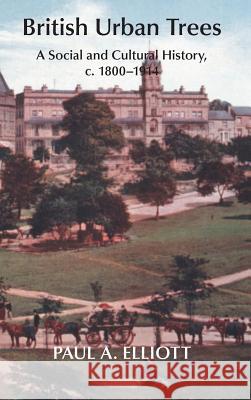British Urban Trees: A Social and Cultural History, c. 1800-1914. » książka
British Urban Trees: A Social and Cultural History, c. 1800-1914.
ISBN-13: 9781874267904 / Angielski / Twarda / 2016 / 420 str.
British Urban Trees: A Social and Cultural History, c. 1800-1914.
ISBN-13: 9781874267904 / Angielski / Twarda / 2016 / 420 str.
(netto: 402,82 VAT: 5%)
Najniższa cena z 30 dni: 419,51 zł
ok. 16-18 dni roboczych
Bez gwarancji dostawy przed świętami
Darmowa dostawa!
Whether we consider the great London Planes which are now the largest trees in many British urban streets, the exotic ornamentals from across the globe flourishing in numerous private gardens, the stately trees of public parks and squares or the dense colourful foliage of suburbia, the impact of trees and arboriculture upon modern towns and their ecosystems is clear. From the formal walks and squares of the Georgian town to Victorian tree-lined boulevards and commemorative oaks, trees are the organic statuary of modern urban society, providing continuity yet constantly changing through the day and over the seasons. Interfacing between humans and nature, connecting the continents and reaching back and forward through time to past and future generations, they have come to define urbanity while simultaneously evoking nature and the countryside. This book is the first major study of British urban arboriculture between 1800 and 1914 and draws upon fresh approaches in geographical, urban and environmental history. It makes a major contribution to our understanding of where, how and why trees grew in British towns in the period, the social and cultural impact of these and the attitudes taken towards them.
Whether we consider the great London Planes which are now the largest trees in many British urban streets, the exotic ornamentals from across the globe flourishing in numerous private gardens, the stately trees of public parks and squares or the dense colourful foliage of suburbia, the impact of trees and arboriculture upon modern towns and their ecosystems is clear. From the formal walks and squares of the Georgian town to Victorian tree-lined boulevards and commemorative oaks, trees are the organic statuary of modern urban society, providing continuity yet constantly changing through the day and over the seasons. Interfacing between humans and nature, connecting the continents and reaching back and forward through time to past and future generations, they have come to define urbanity while simultaneously evoking nature and the countryside. This book is the first major study of British urban arboriculture between 1800 and 1914 and draws upon fresh approaches in geographical, urban and environmental history. It makes a major contribution to our understanding of where, how and why trees grew in British towns in the period, the social and cultural impact of these and the attitudes taken towards them.











